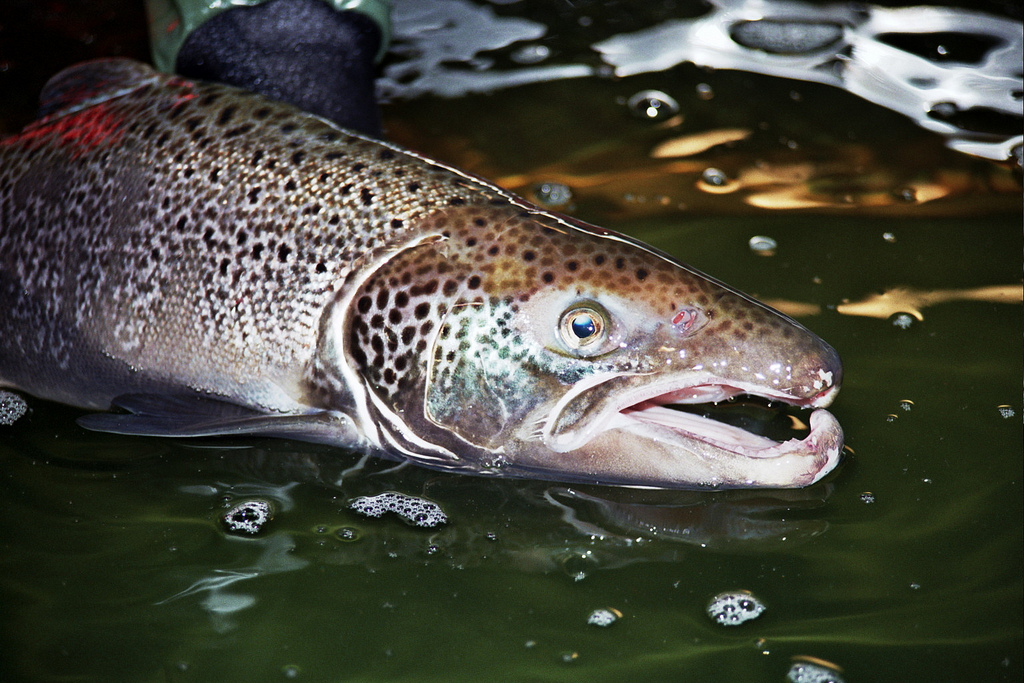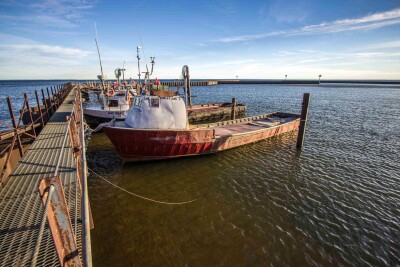The Washington Department of Fish and Wildlife is urging all licensed local fishermen — recreational and professional, alike — to fish as hard as they can for farmed salmon, with no limit on size or number.

A Cooke Aquaculture salmon net pen in Puget Sound collapsed on Saturday, Aug. 20. Wild Fish Conservancy photo
No it’s not exactly shooting fish in a barrel. These salmon are no longer contained by their Cooke Aquaculture net pen near Cypress Island, north of Anacortes, Wash.
The collapse occurred on Saturday afternoon, and the first invasive salmon hit the nets of Native Lummi fishermen on Sunday. The aquaculture company is blaming high tides related to Monday’s solar eclipse.
The collapsed pen contained 305,000 salmon — more than 3 million pounds of fish — of which no one is sure how many escaped.
“It appears that many fish are still contained within the nets,” Cooke said in an early response. “It will not be possible to confirm exact numbers of fish losses until harvesting is completed and an inventory of fish in the pens has been conducted.”
[Editor's Note: As of Wednesday, Aug. 23, Cooke Aquaculture admits the entire pen collapsed on Sunday, Aug. 20, and the spill amounts to a catastrophic 300,000 fish.]
Ron Warren, fish program assistant director for fish and wildlife, described the net pen’s structure as “severely compromised.” (Seattle's Kiro News took aerial video of the collapsed pen.)

The Cooke Aquaculture net that failed is located off Cypress Island in Washington's Puget Sound.
Net pen spills are a consistent threat to wild species. There are simply too many unknowns to call them a safe method of fish production. When will a net fail? We don’t know. How many fish escaped? We don’t know. How will they affect the wild populations into which they were released? We don’t know.
“Tides and currents and tidal surges in the last weeks have been very strong,” said Nell Halse, Cooke’s vice president of communications. “Our people are out there every day, and that is what they have been seeing. The tides were extremely high, the current 3.5 knots. People can believe it or not.”
The problem is not so much that people don't believe in high tides, but rather it's hard to believe an aquaculture company wasn't prepared for such an event.
When you build a net pen for the ocean, it should be constructed to withstand the normal fluctuations of the ocean. A net pen’s inability to withstand high tides makes it a method incompatible with the ocean environment. Full stop. No one who is surprised by high tides should be allowed to build massive and contaminant-ridden fish farms in the ocean.
Halse also dismissed the notion of environmental concerns.
“It’s primarily a business loss,” she said. “The salmon will be food for the seals, and the fishermen can enjoy them.”
You’re welcome.
If we won’t demand that aquaculture businesses tighten up their standards, then we must admit that we, as a nation, knowingly and willingly expose our renewable natural resources to potentially invasive species.
Fishing fleets get shut down if they interact with certain mammals or birds. They get shut down for habitat protections. But what happens when farmed salmon, whose pens are a known hazard, affect the habitat of wild species? The state issues a recall by way of fishing effort, and we go on polluting our water in the name of inexpensive protein.
I know some people make the claim that farmed salmon takes strain off of wild stocks, and perhaps that is true in nations that do not effectively manage their wild-capture fisheries. But it is categorically untrue in the United States of America. We do not manage our fisheries to meet market demand — just ask anyone working in American groundfish, Bering sea crab or Gulf of Mexico snapper fisheries. Those are high-demand fisheries with quotas that cannot satisfy the demand. So what happens? The price goes up. The people who don’t want to pay the price eat something else. Who says that thing has to be farmed fish?
There are plenty of fish in the sea, we just have to think before we eat. Is it better to eat a salmon farmed in open ocean holding pens than to eat a wild pollock? Maybe it’s less intimidating to the buyer to be able to purchase that familiar pale orange fillet — perhaps until that buyer finds out what happens to the ocean floor after years of suffocating under the detritus from an open ocean net pen.
U.S. fisheries are managed to maximize sustainability, preserve habitats, reduce interactions with non-target species, improve fuel efficiency and invent more selective gear. Why do we not hold finfish aquaculture to the same standards? It’s time to get net pens out of the waters of our wild stocks.
Unfortunately, we seem to be going the other way, not learning from our mistakes and committing ourselves to widespread repetition. NOAA recently — and perhaps illegally — announced that it would issue 20 aquaculture permits for the Gulf of Mexico.
Are we waiting for the Salmon Valdez?







